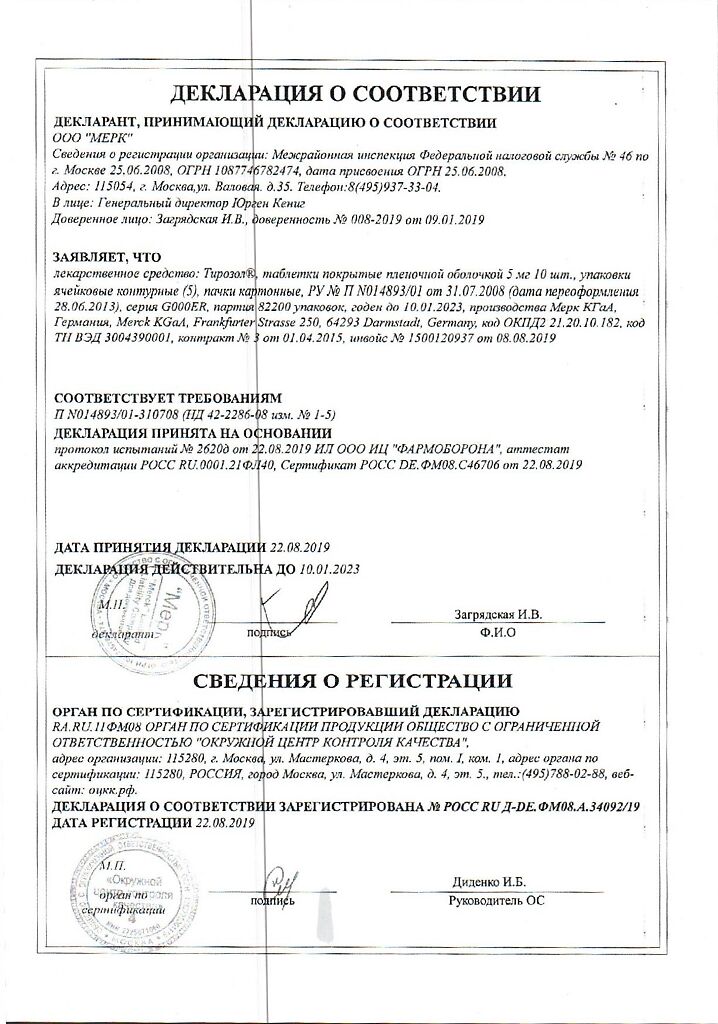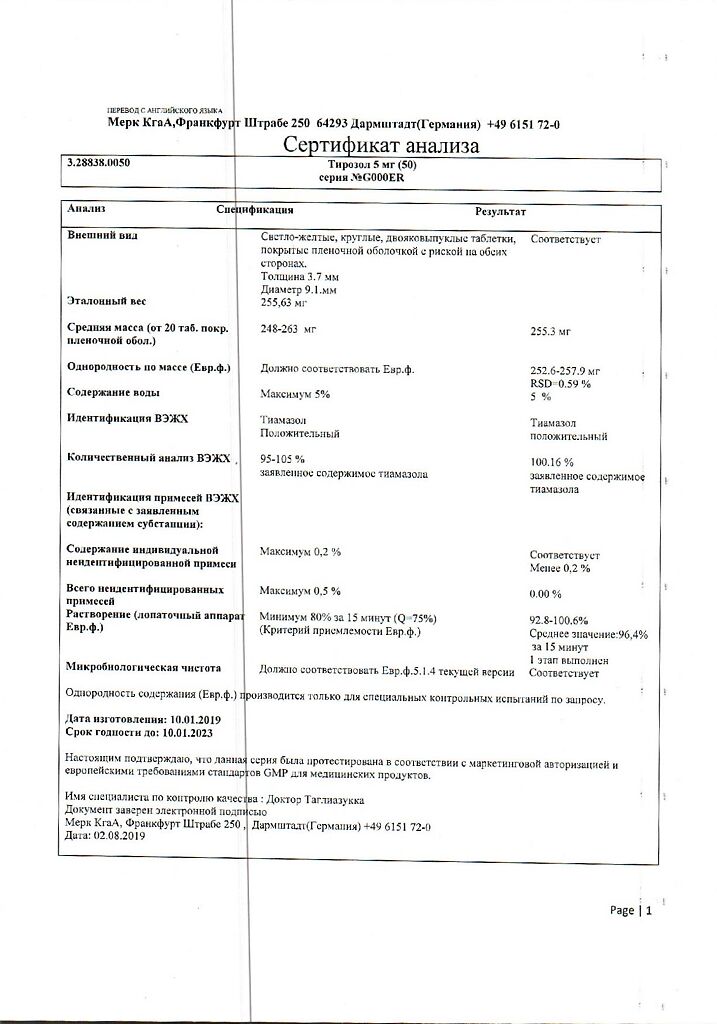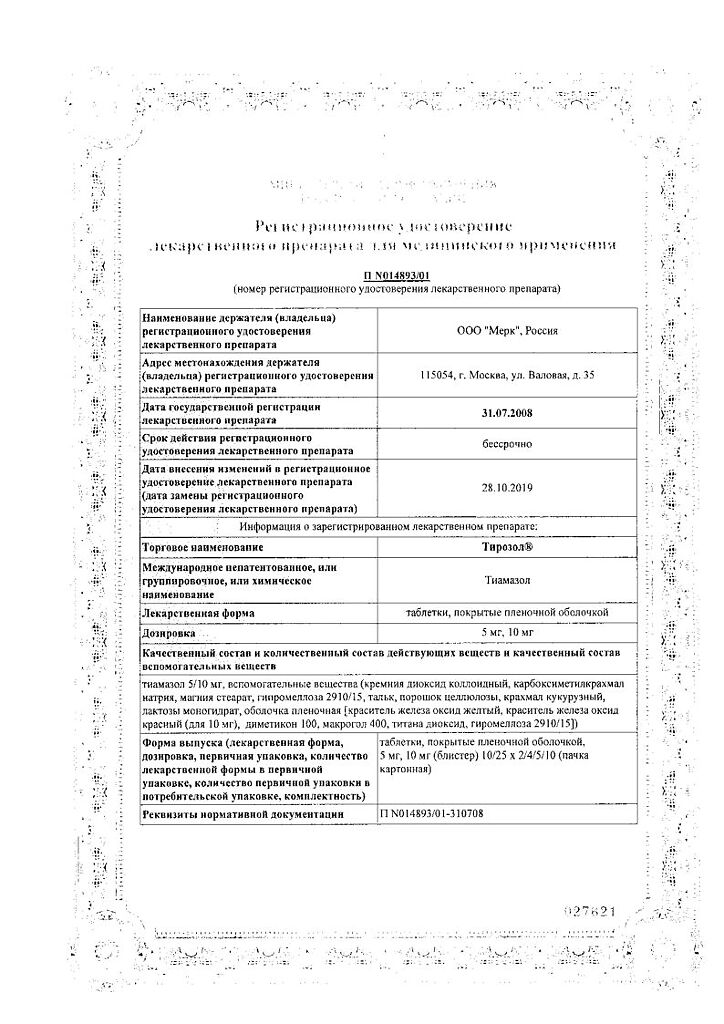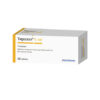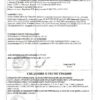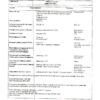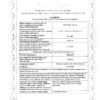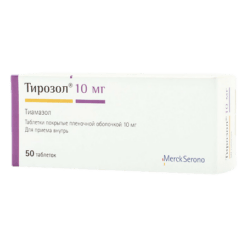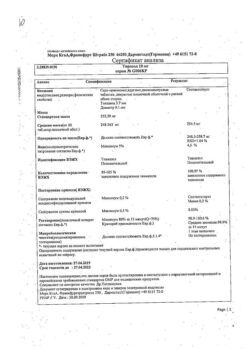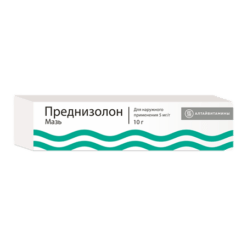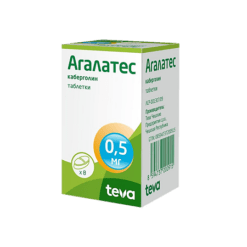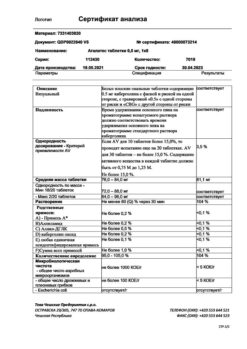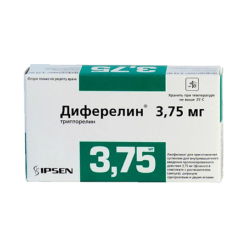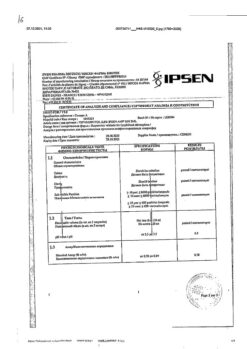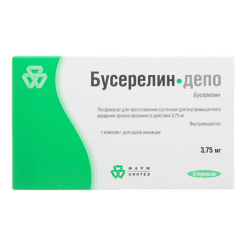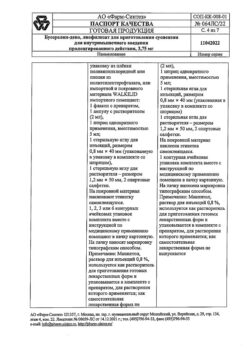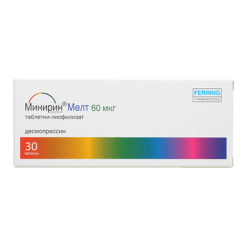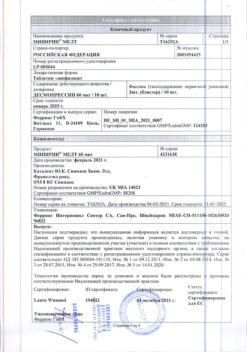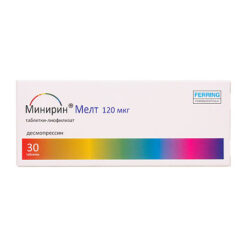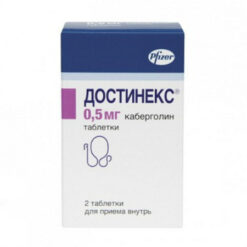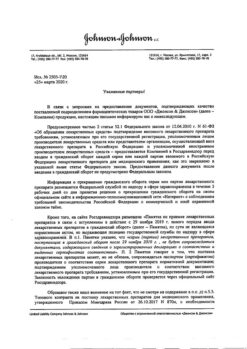No products in the cart.
Thyrozole, 5 mg 50 pcs
€5.43 €4.83
Description
An antithyroid drug. Disrupts synthesis of thyroid hormones by blocking the enzyme peroxidase involved in thyronine iodination in the thyroid gland to form triiodine and tetraiodothyronine. Therefore, the drug is effective in symptomatic therapy of thyrotoxicosis (except for cases of development of the disease due to release of hormones after destruction of thyroid cells after radioactive iodine treatment or in thyroiditis).
Tyrosol does not affect the process of release of synthesized thyronines from thyroid follicles. This explains the latent period of varying duration, which may precede normalization of plasma T3 and T4 levels, i.e. improvement of the clinical picture.
The drug reduces basal metabolism, accelerates iodide excretion from the thyroid gland, and increases reciprocal activation of pituitary TTH synthesis and secretion, which may be accompanied by some thyroid hyperplasia.
The duration of action of the drug after a single dose is almost 24 hours.
Pharmacokinetics
Absorption
Tiamazole is quickly and almost completely absorbed after oral administration. Cmax in plasma is reached within 0.4-1.2 h.
Distribution
It is practically not bound to plasma proteins. It accumulates in the thyroid gland.
Small amounts of thiamazole are found in breast milk.
Metabolism
It is slowly metabolized in the thyroid gland as well as in the kidneys and liver.
Elimination
The T1/2 is about 3-6 hours. Thiamazole is excreted in the urine (within 24 hours 70% of the drug, with 7-12% unchanged) and in the bile.
Pharmacokinetics in special clinical cases
The T1/2 is increased in patients with hepatic insufficiency.
The pharmacokinetic parameters of the drug are independent of the functional state of the thyroid gland.
Indications
Indications
Preparation for surgical treatment of thyrotoxicosis;
preparation for treatment of thyrotoxicosis with radioactive iodine;
therapy during the latent period of radioactive iodine action (carried out before the onset of radioactive iodine action – for 4–6 months);
in exceptional cases – long-term maintenance therapy for thyrotoxicosis, when due to the general condition or for individual reasons it is impossible to perform radical treatment;
prevention of thyrotoxicosis when prescribing iodine preparations (including cases of use of iodine-containing radiocontrast agents), in the presence of latent thyrotoxicosis, autonomous adenomas or a history of thyrotoxicosis.
Pharmacological effect
Pharmacological effect
antithyroid drug. It disrupts the synthesis of thyroid hormones by blocking the enzyme peroxidase, which is involved in the iodination of thyronine in the thyroid gland with the formation of triiodo- and tetraiodothyronine. Therefore, the drug is effective in the symptomatic treatment of thyrotoxicosis (except for cases of disease development due to the release of hormones after the destruction of thyroid cells after treatment with radioactive iodine or in thyroiditis).
Tyrosol does not affect the process of release of synthesized thyronines from the thyroid follicles. This explains the latent period of varying duration, which may precede the normalization of T3 and T4 levels in the blood plasma, i.e. improvement of the clinical picture.
The drug reduces basal metabolism, accelerates the excretion of iodides from the thyroid gland, increases reciprocal activation of the synthesis and secretion of TSH by the pituitary gland, which may be accompanied by some hyperplasia of the thyroid gland.
The duration of action of the drug after a single dose is almost 24 hours.
Pharmacokinetics
Suction
After taking the drug orally, thiamazole is quickly and almost completely absorbed. Cmax in plasma is achieved within 0.4-1.2 hours.
Distribution
Practically does not bind to blood plasma proteins. Cumulates in the thyroid gland.
Small amounts of thiamazole are found in breast milk.
Metabolism
Slowly metabolized in the thyroid gland, as well as in the kidneys and liver.
Removal
T1/2 is about 3-6 hours. Thiamazole is excreted in the urine (within 24 hours, 70% of the drug, with 7-12% unchanged) and bile.
Pharmacokinetics in special clinical situations
In patients with liver failure, T1/2 increases.
The pharmacokinetic parameters of the drug do not depend on the functional state of the thyroid gland.
Special instructions
Special instructions
For patients with a significant enlargement of the thyroid gland, narrowing the lumen of the trachea, Tyrozol® is prescribed for a short time in combination with sodium levothyroxine, because with prolonged use, an increase in goiter and even greater compression of the trachea is possible. It is necessary to carefully monitor the patient (monitoring TSH levels and tracheal lumen).
During treatment with the drug, regular monitoring of peripheral blood patterns is necessary.
Thiamazole and thiourea derivatives may reduce the sensitivity of thyroid tissue to radiation therapy.
If during treatment with the drug a sore throat, difficulty swallowing, increased body temperature, signs of stomatitis or furunculosis (possible symptoms of agranulocytosis) suddenly appear, you should stop taking the drug and consult a doctor immediately.
If subcutaneous hemorrhages or bleeding of unknown origin, generalized skin rash and itching, persistent nausea or vomiting, jaundice, severe pain in the epigastric region and severe weakness appear during treatment, discontinuation of the drug is required.
If treatment is stopped early, a relapse of the disease is possible.
The appearance or worsening of endocrine ophthalmopathy is not a side effect of adequate treatment with Tyrozol®, carried out properly.
In rare cases, after completion of treatment, late hypothyroidism may occur, which is not a side effect of the drug, but is associated with inflammatory and destructive processes in the thyroid tissue that occur as part of the underlying disease.
Impact on the ability to drive vehicles and operate machinery
Thiamazole does not affect the ability to drive vehicles and machinery.
Active ingredient
Active ingredient
Thiamazole
Composition
Composition
1 tablet thiamazole 5 mg
Excipients:
colloidal silicon dioxide – 2 mg,
sodium carboxymethyl starch – 2 mg,
magnesium stearate – 2 mg,
hypromellose 2910/15 – 3 mg,
talc – 6 mg,
cellulose powder – 10 mg,
corn starch – 20 mg,
lactose monohydrate – 200 mg.
Film shell composition:
iron dye yellow oxide – 0.04 mg, dimethicone 100 – 0.16 mg, macrogol 400 – 0.79 mg, titanium dioxide – 1.43 mg, hypromellose 2910/15 – 3.21 mg.
Contraindications
Contraindications
Hypersensitivity to thiamazole and thiourea derivatives;
agranulocytosis during previous therapy with carbimazole or thiamazole;
granulocytopenia (including history);
cholestasis before starting treatment;
therapy with tmpmazole in combination with levothyroxine during pregnancy;
children under 3 years of age.
Tyrosol® contains lactose, therefore its use is not recommended in patients with rare hereditary diseases associated with galactose intolerance, lactase deficiency or glucose-galactose malabsorption syndrome.
The drug should be used with caution in case of very large goiter with narrowing of the trachea (only short-term treatment during preparation for surgery), and in case of liver failure.
Side Effects
Side Effects
From the hematopoietic system: uncommon – agranulocytosis (symptoms may appear even weeks and months after the start of treatment and lead to the need to discontinue the drug); very rarely – generalized lymphadenopathy, thrombocytopenia, pancytopenia.
From the endocrine system: very rarely – insulin autoimmune syndrome with hypoglycemia.
From the nervous system: rarely – a reversible change in taste sensations, dizziness; very rarely – neuritis, polyneuropathy.
From the digestive system: very rarely – enlargement of the salivary glands, vomiting.
From the liver and biliary tract: very rarely – cholestatic jaundice and toxic hepatitis.
From the skin and subcutaneous tissues: very rarely – generalized skin rashes, alopecia, lupus-like syndrome.
Allergic reactions: skin manifestations (itching, redness, rashes).
From the musculoskeletal system: often – slowly progressive arthralgia without clinical signs of arthritis.
General reactions: rarely – fever, weakness, weight gain.
Interaction
Interaction
When prescribing the drug after using iodine-containing radiocontrast agents in a high dose, the effect of thiamazole may be weakened.
Lack of iodine enhances the effect of thiamazole.
In patients taking Tyrozol® for thyrotoxicosis, after achieving a euthyroid state (normalization of thyroid hormone levels in the blood serum), it may be necessary to reduce the doses of cardiac glycosides (digoxin and digitoxin), aminophylline, as well as increase the doses of warfarin and other anticoagulants – coumarin and indanedione derivatives (pharmacodynamic interaction).
Lithium preparations, beta-blockers, reserpine, amiodarone increase the effect of thiamazole (dosage adjustment is required).
When used simultaneously with sulfonamides, metamizole sodium and myelotoxic drugs, the risk of developing leukopenia increases.
Leukogen and folic acid, when used simultaneously with thiamazole, reduce the risk of developing leukopenia.
Gentamicin enhances the antithyroid effect of thiamazole.
There are no data on the effect of other drugs on the pharmacokinetics and pharmacodynamics of the drug. However, it should be borne in mind that with thyrotoxicosis, the metabolism and elimination of substances is accelerated. Therefore, in some cases it is necessary to adjust the dose of other drugs.
Overdose
Overdose
Symptoms: with long-term use of the drug in high doses, the development of subclinical and clinical hypothyroidism is possible, as well as an increase in the size of the thyroid gland due to an increase in the level of TSH in the blood. This can be avoided by reducing the dose of the drug until a state of euthyroidism is achieved or, if necessary, by additionally prescribing levothyroxine sodium.
As a rule, after discontinuation of the drug Tyrozol®, spontaneous restoration of thyroid function is observed. Taking thiamazole in very high doses (about 120 mg/day) can lead to the development of myelotoxic effects. The drug in such doses should be used only for special indications (severe forms of the disease, thyrotoxic crisis).
Treatment: discontinuation of the drug, gastric lavage, symptomatic therapy, if necessary, switching to an antithyroid drug of another group.
Storage conditions
Storage conditions
The drug should be stored out of the reach of children, in a dry place at a temperature not exceeding 25°C.
Shelf life
Shelf life
4 years.
Manufacturer
Manufacturer
Merck Healthcare KGaA, Germany
Additional information
| Shelf life | 4 years. |
|---|---|
| Conditions of storage | The drug should be kept out of reach of children, in a dry place at a temperature not exceeding 25°C. |
| Manufacturer | Merck Healthcare KGaA, Germany |
| Medication form | pills |
| Brand | Merck Healthcare KGaA |
Other forms…
Related products
Buy Thyrozole, 5 mg 50 pcs with delivery to USA, UK, Europe and over 120 other countries.


